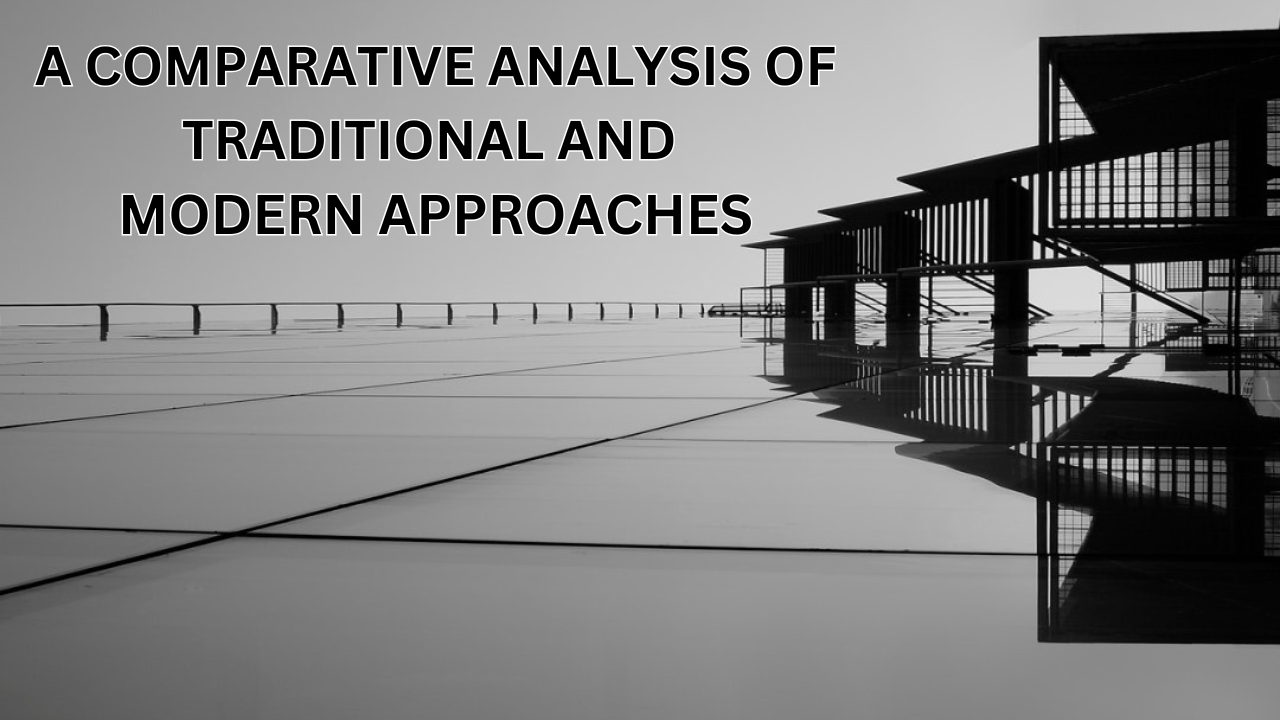In today’s rapidly evolving world the methods and strategies we employ to address challenges have undergone significant transformations a comparative analysis of traditional and modern approaches offers valuable insights into how societal technological and cultural shifts have reshaped the way we think act and solve problems traditional approaches often rooted in longstanding practices and time-tested knowledge emphasize the importance of heritage continuity and a deep connection to cultural or historical contexts these methods have been passed down through generations relying on familiarity and the wisdom of experience.
On the other hand, modern approaches are often characterized by innovation efficiency and the embrace of technological advancements with the rise of globalization digital tools and a fast-paced society modern strategies often prioritize speed scalability, and adaptability to meet the dynamic demands of contemporary life while both approaches have their merits and drawbacks understanding their respective strengths and weaknesses can offer a comprehensive perspective on how we can best address today complex challenges by examining both perspectives we can identify areas where these approaches can complement each other paving the way for more holistic effective solutions.
Traditional Approaches:
Traditional approaches to health and well-being often emphasize the importance of long-established practices and wisdom passed down through generations these methods are grounded in a deep understanding of nature culture and the human body reflecting a holistic view of health that integrates physical emotional and spiritual well-being in nutrition for instance, traditional diets were typically rooted in local seasonal foods tailored to the environment and the unique needs of a community physical activity often revolved around natural movement patterns like walking gardening or other forms of labor ensuring an active lifestyle without the need for structured exercise routines.
Mental and emotional health was often supported by community bonds family structures and practices like mindfulness meditation or spiritual reflection while modern medicine and technology have brought significant advances in healthcare these traditional approaches remain relevant because they offer a sense of balanced connection and simplicity that many people find increasingly appealing in today fast-paced world by drawing upon the wisdom of traditional approaches individuals can embrace a more holistic view of well-being promoting not just physical health but also emotional resilience and social cohesion.
Modern Approaches:
Modern approaches to health and well-being are characterized by a focus on scientific advancements technological innovation and specialized healthcare practices with the rise of modern medicine, there has been a shift toward evidence-based treatments and interventions designed to address specific health issues with precision from advanced diagnostic tools like MRI and CT scans to breakthrough treatments such as gene therapy and immunotherapy modern medicine is capable of diagnosing and treating diseases that were once considered untreatable in addition to medical advancements modern approaches to health also emphasize the importance of mental and emotional well-being through therapies like cognitive behavioral therapy (CBT).
Modern health trends often incorporate fitness technology such as wearables and health apps which provide individuals with data-driven insights into their physical activity sleep and overall well-being nutrition has also evolved with a focus on personalized diets informed by genetic testing and a deeper understanding of the microbiome despite the efficiency and precision of modern approaches they can sometimes neglect the broader holistic view of health which has led many to seek ways to integrate modern advancements with traditional wisdom to create a more balanced and comprehensive approach to well-being.
Comparative Analysis:
A comparative analysis of traditional and modern approaches to health reveals both distinct differences and surprising similarities highlighting the evolving landscape of well-being traditional methods are rooted in time-tested practices that emphasize natural remedies community connections and holistic care focusing on the balance between the body and mind, and spirit these approaches often prioritize prevention and self-sufficiency encouraging individuals to live in harmony with their environment eat locally sourced foods, and engage in physical activity as part of daily life on the other hand modern health approaches leverage the power of scientific advancements offering targeted treatments.
The emphasis is on precision efficiency and individualization with innovations such as genetic testing personalized medicine and advanced diagnostics leading to more tailored healthcare solutions while modern approaches provide incredible tools for treating diseases and managing health conditions they can sometimes overlook the broader preventative aspects of wellness that traditional methods emphasize both systems are increasingly finding ways to complement.
Healthcare Traditional Approaches:
Traditional healthcare approaches are deeply rooted in the practices and knowledge passed down through generations often shaped by cultural beliefs local resources and a profound understanding of the human body’s natural rhythms these methods prioritize a holistic view of health where the body mind and spirit are seen as interconnected treatments in traditional healthcare often involve herbal remedies acupuncture massage and other natural therapies that aim to restore balance and promote healing from within for example, traditional Chinese medicine focuses on the flow of energy throughout the body using herbs acupuncture and dietary changes to maintain health and treat illness.
Similarly, the ancient system of medicine from India emphasizes balancing the body three through diet lifestyle adjustments, and natural remedies in many Indigenous cultures healthcare also involves spiritual healing practices community support, and a deep connection to nature reflecting the belief that physical illness is often linked to emotional or spiritual distress these traditional practices emphasize prevention self-care and maintaining overall well-being rather than simply treating illness once it arises.
